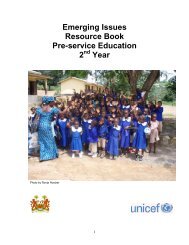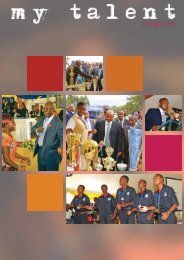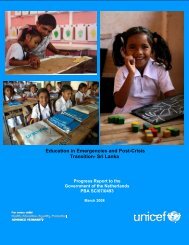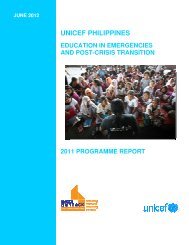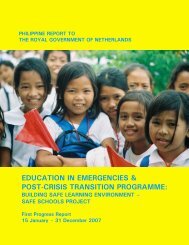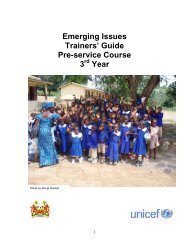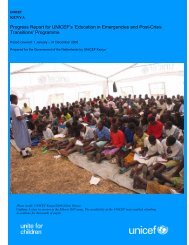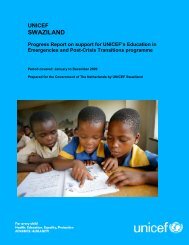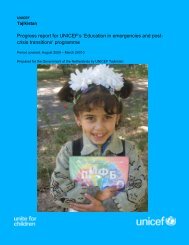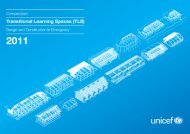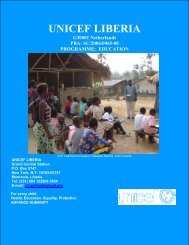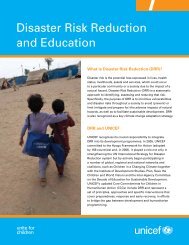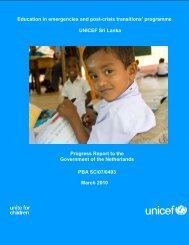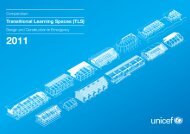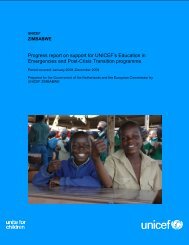Disaster Risk Reduction in School Curricula: Case Studies ... - Unicef
Disaster Risk Reduction in School Curricula: Case Studies ... - Unicef
Disaster Risk Reduction in School Curricula: Case Studies ... - Unicef
Create successful ePaper yourself
Turn your PDF publications into a flip-book with our unique Google optimized e-Paper software.
105<br />
East Asia and the Pacific<br />
Women discuss landm<strong>in</strong>e awareness<br />
<strong>in</strong> Vientiane, the capital of the Lao<br />
People's Democratic Republic.<br />
© UNICEF/NYHQ1996-0843/Semeniuk<br />
all ages. DRR curricula predicated upon the participatory and<br />
child-centred approach challenged traditional lecture-based<br />
teach<strong>in</strong>g methods (Vanaspong, 2011).<br />
The project evaluation reports the positive impact of childcentred<br />
pedagogies on both students and teachers. Even<br />
though general life skills improvement was not an <strong>in</strong>tended<br />
project objective, teachers noticed that children learnt ‘skills<br />
<strong>in</strong> daily life such as be<strong>in</strong>g more responsible, punctual and<br />
cooperative’ and also ‘learnt to listen to their friends and th<strong>in</strong>k<br />
more of others and about issues faced by their communities’<br />
(Ibid). Parents also noticed that children had developed ‘more<br />
social skills and communicate better <strong>in</strong> daily life’ (Ibid). The<br />
participat<strong>in</strong>g children themselves reported an <strong>in</strong>creased sense<br />
of confidence <strong>in</strong> express<strong>in</strong>g themselves and ‘th<strong>in</strong>k<strong>in</strong>g and<br />
do<strong>in</strong>g th<strong>in</strong>gs by themselves’, which are significant<br />
achievements <strong>in</strong>sofar as they defy traditional cultural norms. In<br />
terms of knowledge and skills, students ga<strong>in</strong>ed an understand<strong>in</strong>g<br />
of the causes and impact of disasters, thus better<br />
understand<strong>in</strong>g their own communities through risk analysis,<br />
and teamwork and leadership skills (Ibid). The participat<strong>in</strong>g<br />
teachers ‘applied child centred approach <strong>in</strong> their classes’,<br />
although they always provided lectured beforehand (Ibid, 46).<br />
One of the unexpected f<strong>in</strong>d<strong>in</strong>gs was ‘the teachers directly<br />
l<strong>in</strong>ked the DRR modules with <strong>in</strong>crease <strong>in</strong> school attendance.<br />
This was due to the teachers be<strong>in</strong>g tra<strong>in</strong><strong>in</strong>g <strong>in</strong> child-centred<br />
teach<strong>in</strong>g and learn<strong>in</strong>g and this learn<strong>in</strong>g was used <strong>in</strong> other<br />
classrooms which made children enjoy class more!’ 43 .<br />
The project report notes that <strong>in</strong> children’s capacity build<strong>in</strong>g,<br />
it is important to work more with adults to facilitate mean<strong>in</strong>gful<br />
child participation (Ibid, 20).<br />
Student Assessment<br />
No details of DRR-specific student assessment have been<br />
found with<strong>in</strong> available MDRD-EDU documentation.<br />
Teacher Professional Development/Guidance<br />
A teacher’s guide accompany<strong>in</strong>g the student modules and six<br />
supplementary story booklets on hazard related topics (e.g.,<br />
road accidents, pollution, fire and storm, drought and<br />
landslides) were developed (ASEAN/UNISDR, 2011).<br />
There were capacity-build<strong>in</strong>g tra<strong>in</strong><strong>in</strong>g opportunities <strong>in</strong> both<br />
phases of MDRD-EDU project. Dur<strong>in</strong>g phase one, two tra<strong>in</strong><strong>in</strong>g<br />
sessions were provided to participants <strong>in</strong>clud<strong>in</strong>g pr<strong>in</strong>cipals and<br />
teachers of the selected pilot schools, district and prov<strong>in</strong>cial<br />
educational officers, and district pedagogical advisors<br />
(32 participants for the first and 18 for the second). Dur<strong>in</strong>g<br />
phase two, teacher-tra<strong>in</strong>ers from eight prov<strong>in</strong>cial tra<strong>in</strong><strong>in</strong>g<br />
centres took part <strong>in</strong> the tra<strong>in</strong><strong>in</strong>g (ADPC, 2010). A series of<br />
teacher tra<strong>in</strong><strong>in</strong>g and <strong>in</strong>struction <strong>in</strong> tra<strong>in</strong>er events was also<br />
conducted <strong>in</strong> order to build the capacity of teachers and of<br />
regional centre tra<strong>in</strong><strong>in</strong>g officers of the MoE National Teachers<br />
Tra<strong>in</strong><strong>in</strong>g Institute. The specific purpose of ToT was to enable<br />
them to lead the <strong>in</strong>tegration of the DRR tra<strong>in</strong><strong>in</strong>g module <strong>in</strong>to<br />
the exist<strong>in</strong>g annual programme of tra<strong>in</strong><strong>in</strong>g of teachers <strong>in</strong> their<br />
jurisdiction 44 .<br />
43<br />
Danielle Wade, Save the Children Australia, to Fumiyo Kagawa,<br />
20 October 2011.<br />
44<br />
Alex Fowler, ADPC, to Fumiyo Kagawa 23 November 2011.<br />
<strong>Disaster</strong> <strong>Risk</strong> <strong>Reduction</strong> <strong>in</strong> <strong>School</strong> <strong>Curricula</strong>: <strong>Case</strong> <strong>Studies</strong> from Thirty Countries



